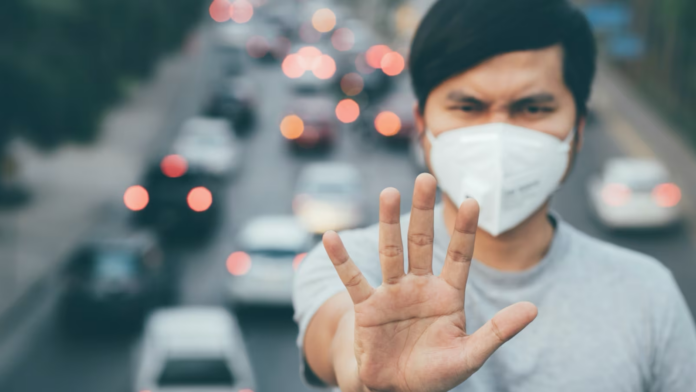Air pollution and lung cancer are increasingly becoming intertwined as research uncovers the devastating effects of polluted air on non-smokers. While lung cancer has historically been associated with smoking, studies now reveal that long-term exposure to air pollutants can also significantly increase the risk for individuals who have never smoked. Dr. Chandrashekhar Prasad Singh, a medical oncologist, emphasizes the importance of awareness, vigilance, and early intervention in combating this silent threat.
Understanding the Link Between Air Pollution and Lung Cancer
Air pollution consists of a complex mixture of harmful particles and gases, such as particulate matter (PM2.5 and PM10), nitrogen dioxide (NO₂), sulfur dioxide (SO₂), and volatile organic compounds (VOCs). These pollutants infiltrate the respiratory system, causing inflammation, oxidative stress, and cellular damage, which can lead to mutations and, eventually, cancerous growths in lung tissue.
A groundbreaking study published in The Lancet has shown that exposure to fine particulate matter (PM2.5) increases the risk of developing lung cancer in non-smokers by up to 30%. This finding underscores the urgency of addressing air pollution as a major public health issue.

Key Symptoms to Watch For
Lung cancer in non-smokers often goes undetected until it reaches advanced stages. Dr. Singh highlights several symptoms that should never be ignored:
- Persistent cough lasting more than a few weeks.
- Chest pain that worsens with deep breathing or coughing.
- Shortness of breath or wheezing.
- Unexplained weight loss or fatigue.
- Recurrent respiratory infections.
These symptoms, while not exclusive to lung cancer, warrant immediate medical attention for proper diagnosis and treatment.
Who Is Most at Risk?
Non-smokers exposed to air pollution face varying degrees of risk based on several factors:
- Urban Residents: Cities with high traffic congestion and industrial activities tend to have elevated levels of air pollution, making urban residents particularly vulnerable.
- Occupational Exposure: Jobs involving prolonged exposure to industrial emissions, construction dust, or chemicals increase the likelihood of lung cancer.
- Genetic Predisposition: Individuals with a family history of lung cancer may be more susceptible to the carcinogenic effects of air pollution.
Protective Measures Against Air Pollution
While completely eliminating exposure to air pollution may not be feasible, adopting certain strategies can reduce the associated risks:
- Invest in Air Purifiers: High-quality air purifiers with HEPA filters can significantly improve indoor air quality.
- Limit Outdoor Activities: Avoid outdoor exercise or activities during high pollution hours, typically early mornings and late evenings in urban areas.
- Wear Masks: N95 or equivalent masks can filter out harmful particles during periods of severe air pollution.
- Green Living: Incorporate indoor plants like snake plants and peace lilies, which can help purify the air.
- Advocate for Cleaner Air: Support initiatives aimed at reducing industrial emissions, promoting clean energy, and enhancing urban greenery.
The Role of Early Detection in Survival
Dr. Singh emphasizes that early detection is critical for improving survival rates in lung cancer patients. Regular health check-ups, especially for individuals in high-risk groups, can lead to early diagnosis and better outcomes. Diagnostic tools like low-dose computed tomography (CT) scans can identify lung abnormalities at an early stage, allowing for timely intervention.

Global Perspective: Air Pollution and Public Health
Air pollution has been recognized by the World Health Organization (WHO) as a leading environmental health risk. It is estimated that over 4 million premature deaths annually are linked to air pollution, with lung cancer being a significant contributor. The burden of air pollution-related diseases is disproportionately higher in developing countries, where regulatory frameworks and pollution control measures are often inadequate.
Treatment Options for Lung Cancer in Non-Smokers
Advances in medical technology have significantly improved the treatment landscape for lung cancer. Depending on the stage and type of cancer, treatment options include:
- Surgery: Removal of the tumor and affected lung tissue.
- Radiation Therapy: Targeted treatment to destroy cancer cells.
- Chemotherapy: Drugs to kill or slow the growth of cancer cells.
- Immunotherapy: Boosting the body’s immune system to fight cancer.
- Targeted Therapy: Medications designed to attack specific genetic mutations in cancer cells.
Dr. Singh underscores that a multidisciplinary approach involving oncologists, pulmonologists, and radiologists is crucial for personalized treatment planning.
Addressing the Root Cause: Tackling Air Pollution
Governments and policymakers must prioritize reducing air pollution through stringent regulations and public awareness campaigns. Key measures include:
- Transitioning to renewable energy sources to reduce reliance on fossil fuels.
- Implementing stricter vehicle emission standards.
- Promoting public transportation and electric vehicles.
- Enhancing green cover in urban areas to act as natural air filters.
- Raising public awareness about the health risks associated with air pollution.
Prioritizing Health Amid Environmental Challenges
The connection between air pollution and lung cancer highlights the pressing need for collective action to safeguard public health. For non-smokers, the risk posed by polluted air serves as a wake-up call to adopt preventive measures, prioritize early detection, and advocate for cleaner environments. Addressing air pollution not only reduces the incidence of lung cancer but also enhances overall quality of life for communities worldwide.

